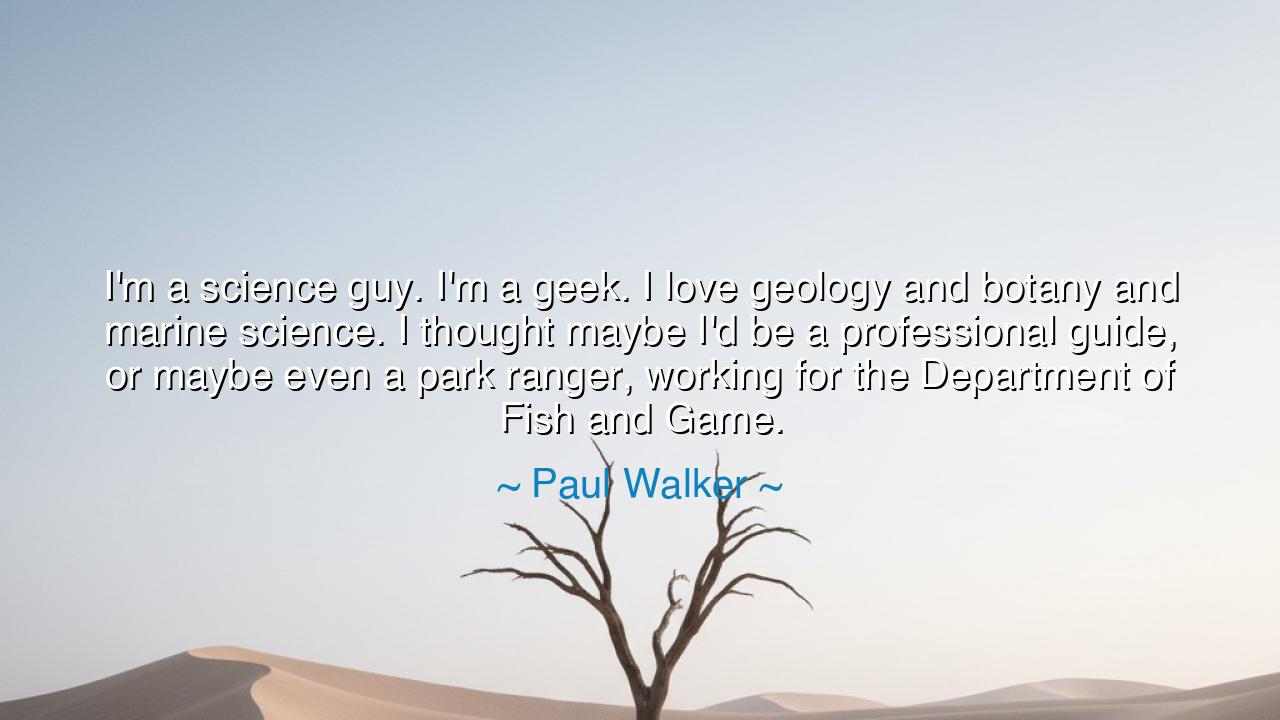
I'm a science guy. I'm a geek. I love geology and botany and
I'm a science guy. I'm a geek. I love geology and botany and marine science. I thought maybe I'd be a professional guide, or maybe even a park ranger, working for the Department of Fish and Game.






Listen now, O children of wisdom, for the words of Paul Walker speak to the soul of curiosity and the pursuit of knowledge, reminding us of the deeper call of nature and the wonders it holds. He said: “I’m a science guy. I’m a geek. I love geology and botany and marine science. I thought maybe I’d be a professional guide, or maybe even a park ranger, working for the Department of Fish and Game.” These words are not just the musings of a beloved actor but a revelation of a passion for the natural world, a deep love for geology, botany, and marine science, that speaks to the spirit of exploration and the deep, unspoken connection between humanity and the earth.
What, then, do these words mean, O seekers of truth? Paul Walker, though known to the world for his roles on the screen, reveals the heart of a true scientist, a soul drawn to the study of the earth and its creatures. His love for nature, for the earth beneath his feet and the oceans that stretch before him, reflects a curiosity that seeks to understand the world not just through observation, but through an intimate connection with the natural world. Walker’s vision of becoming a guide or a park ranger is not simply the desire for a job—it is the call of the earth itself, urging him to explore, to protect, and to serve the land and wildlife that have sustained humanity since the dawn of time. His words are a reminder that science is not confined to laboratories or classrooms, but can be found in the very outdoors, in the mountains, the forests, and the oceans that surround us.
Let us recall the story of John Muir, the great naturalist and explorer, whose deep love for the land led to the establishment of Yosemite National Park. In the late 19th century, Muir was captivated by the beauty of the California wilderness and sought to study the geology and botany of the region. His observations and writings inspired many to recognize the importance of protecting natural spaces for future generations. Muir’s passion for the earth led him to found the Sierra Club, which became a powerful force in advocating for the protection of America’s wilderness. His life's work was not driven by the pursuit of fame or wealth, but by a deep, sacred bond with the land—a bond that Paul Walker echoed in his own admiration for nature.
In a more recent context, think of the work of Jane Goodall, whose studies of chimpanzees in Gombe Stream National Park forever changed our understanding of animal behavior and the deep connection between humans and animals. Like Walker, Goodall was not just a scientist, but a passionate advocate for the protection and conservation of the natural world. She saw the world not as something to conquer or control, but as something to understand, to respect, and to preserve. Her dedication to the study of wildlife led her to become one of the world’s most respected figures in environmental science, demonstrating that a life of scientific inquiry can also be one of service to the earth and its inhabitants.
The lesson, O children, is this: Science is not merely a pursuit of facts and figures, but a journey to understand the very life force that sustains all living things. Just as Paul Walker found fulfillment in geology, botany, and marine science, so too should you seek the deeper mysteries of the world around you. Whether you are drawn to the land, the sea, or the sky, know that every path of scientific inquiry is a path toward understanding and respect for the earth itself. The more we learn, the more we understand the delicate balance of nature, and the greater our responsibility to protect it.
So, O children of the future, do not be content with the world as it is. Embrace the sciences, not just for the knowledge they provide, but for the connection they foster between humanity and the natural world. Become guides and protectors, not just of nature, but of the understanding that comes with knowing it deeply. Pursue what calls to you, whether it is geology, marine science, or the study of wildlife, for it is through this pursuit that you will find both personal fulfillment and a greater purpose: to protect and to serve the earth that has given us life.
Let your hearts be filled with the spirit of exploration, as Walker did, and as those before him have done. Seek the truths of the earth and the oceans, the mountains and the skies. Let your studies be guided by a deep reverence for nature, and let that reverence guide your work in the world. For in this pursuit, you will not only uncover the secrets of the world around you, but you will also discover your place in the greater web of life, where knowledge and respect for the earth are not just duties, but sacred responsibilities. May your journey be one of wisdom, discovery, and service to the world that sustains us all.






AAdministratorAdministrator
Welcome, honored guests. Please leave a comment, we will respond soon